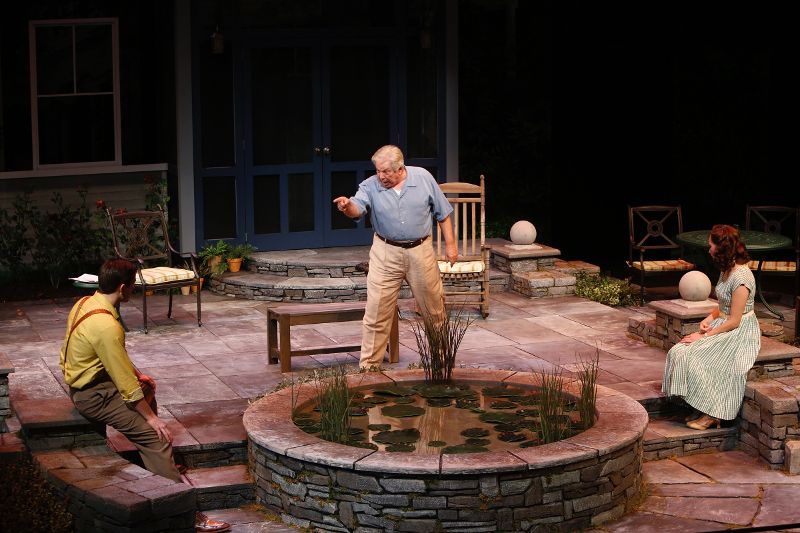
Rep’s ALL MY SONS is Miller’s searing, must-see drama about post-WWII America and the American Dream
– By Cate Marquis –
We tend to think of post-World War II America in sunny, idyllic terms. The “greatest generation” defeated the Nazis, the GIs came home to settle down and start the baby boom, and the country was beginning a post-war economic boom. But beneath the still waters of American suburbia, turbulent currents were churning from war’s aftermath. It is those hidden costs of war that drives to explosive and gripping drama of ALL MY SONS.
Arthur Miller’s emotionally searing drama ALL MY SONS is getting much deserved run at the Repertory Theater of St. Louis, January 4-29. The play was Miller’s first Broadway hit, and a drama that explores the dark side of the American Dream.
After the war, Americans were eager to put what happened during it behind them but not soldiers came home and not everything American industry did in war effort was patriotically perfect. These two facts haunt the Keller family. Of the two sons the Kellers sent to war, only one returned. Larry, the older son, was reported missing in action, but two years after the war’s end, it seems unlikely he will be coming home. Nonetheless, his mother Kate (Margaret Daly) clings to the belief he is still alive, and grasps at every report of a soldier found at long last. Her husband Joe (John Woodson) and remaining son Chris (Patrick Ball) tiptoe around this obsession but pretending to maintain that hope is wearing thin. Meanwhile, Chris has fallen in love with Ann Deever (Mairin Lee), who was his brother’s girlfriend during the war.
Chris’ invitation to Ann to visit his parents’ home sparks tensions and hopes in Chris and Joe that the family can finally move on. At first, the audience assumes that Kate Keller’s hopeless belief in her son’s return will drive the play’s plot but the drama takes an unexpected turn, one of many startling twists. It is revealed that during the war, factory owner Joe Keller was accused to delivering faulty parts for airplanes, and concealing the defects, resulting in deadly crashes. Joe was arrested and imprisoned but eventually cleared of criminal charges, although his longtime factory manager Steve Deever was convicted and jailed. Still the scandal and doubts linger, although outgoing, charismatic Joe has rebounded in popularity with his neighbors.
The neighbors are part of the play’s exploration of the other side of the American Dream. Next-door neighbor Jim Bayliss (Jim Ireland) is a doctor who is financially successful but unhappy in both his ambitious wife Sue (Amy Hohn) and his work. Sweet, bubbly Lydia (Emily Kunkel) is married to Frank Lubey (Grant Fletcher Prewitt), but the return of Ann’s brother George (Zac Hoogendyk), who was once Lydia’s boyfriend, raises questions for both George and Lydia of what might have been. George also plays a pivotal role late in the play. The cast is rounded out by Bert (Ana McAlister), a young boy from the neighborhood who idolizes Joe.
Director Seth Gordon shows a clear vision with this material. The acting is superb in this high-voltage play, where confrontations explode as truths are revealed. Among the strongest is Woodson as Joe Keller, a larger-than-life personality who is also a kind of bully, using his considerable charm to bend everyone to his will. Daly as his wife wavers between resisting his efforts and clinging to her own preferred delusions, and abetting Joe in his quest to remake the world has he would like it. Ball as his son Chris is eager to please his father at first but finally sees where he must draw a moral line. The characters with the most complex path are Ann and her brother George, the children of the convicted manager. George is one of the few who sees through Joe Keller’s irresistible charm to the manipulation beneath, yet even he has trouble standing up to it. Both Hoogendyk and Lee are excellent as George and Ann work through that fraught emotional landscape
The set for this drama is perfect – the backyard of large but comfortable looking house. It is the kind of yard that looks like it would have welcomed neighbors and been the site of countless barbecues. The single set is designed maximize movement in and out for the cast, giving it an admirable flexibility. The house is built to let us see into parts of the house, upstairs and down, with a screen door through which actors enter and exit. Characters also enter from paths leading down stage to neighbor’s yards, or from the sides, as if coming from the house’s front. Putting the two-story house at the center of all the movement, lets it serve as a metaphor of the family’s place as dominant fixtures of their community.
As each new detail or hidden fact comes to light, the emotional fire of the play ratchets upward, until in the final moments violence seems imminent. Both personal clashes – between a strong willed father and the less favored son, between mother of a lost son and the girl she feels should remain devoted to his memory – and the philosophical exploration – the hidden human costs beneath post-war America’s embrace of materialism and conformity – force the audience to think. The audience also is sweep over a waterfall of heartbreak and searing emotions, caught in a current they did not detect at the play’s mild start. The rawness of feeling and the toxic power of secrets makes ALL MY SONS an electrifying play that no one should miss.
© Cate Marquis